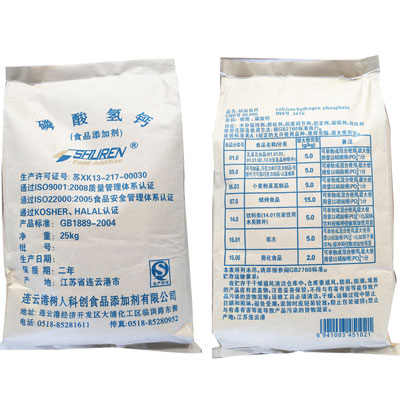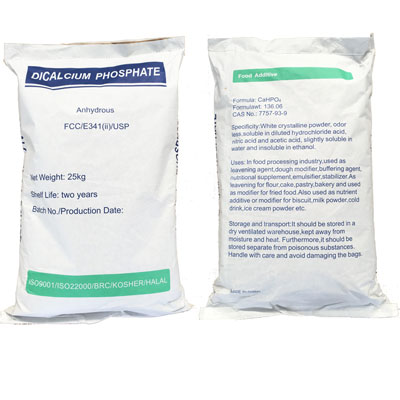

| 指标名称 | Name of index | FCC-V | E 341 (ii) | USP-30 | |
| 外观 | Description | White crystal or granular, granular powder or powder | |||
| 含量 | Assay | % | 97.0-105.0 | 98.0--102.0(200℃, 3h) | 98.0-100.5 |
| P2O5含量(无水物) | P2O5 Content(Anhydrous basis) | % | -- | 50.0--52.5 | -- |
| 鉴别试验 | Identification | Pass test | Pass test | Pass test | |
| 溶解测试 | Solubility tests | -- | Sparingly soluble in water. Insoluble in ethanol | -- | |
| 氟化物 | Fluoride, | ≤mg/kg | 50 | 50(expressed as fluorine) | 50 |
| 灼烧失重 | Loss on ignition, (After ignition at 800℃±25℃ for 30minutes) | % | 7.0-8.5 (Anhydrous) 24.5-26.5 (Dihydrate) | ≤8.5 (Anhydrous) ≤26.5 (Dihydrate) | 6.6-8.5 (Anhydrous) 24.5-26.5 (Dihydrate) |
| 碳酸盐 | Carbonate | -- | -- | Pass test | |
| 氯 | Chloride | ≤% | -- | -- | 0.25 |
| 硫酸盐 | Sulphate | ≤% | -- | -- | 0.5 |
| 砷 | Arsenic | ≤mg/kg | 3 | 1 | 3 |
| 钡 | Barium | -- | -- | Pass test | |
| 重金属 | Heavy metals | ≤mg/kg | -- | -- | 30 |
| 酸不溶物 | Acid-insoluble substance | ≤% | -- | -- | 0.2 |
| 有机挥发杂质 | Organic volatile impurities | -- | -- | Pass test | |
| 铅 | Lead | ≤mg/kg | 2 | 1 | -- |
| 镉 | Cadmium | ≤mg/kg | -- | 1 | -- |
| 汞 | Mercury | ≤mg/kg | -- | 1 | -- |
| 铝 | Aluminium | -- | Not more than 100 mg/kg for the anhydrous form and not more than 80 mg/kg for the dihydrated form (only if added to food for infants and young children) Not more than 600 mg/kg for the anhydrous form and not more than 500 mg/kg for the dihydrated form (for all uses except food for infants and young children). This applies until 31 March 2015. Not more than 200 mg/kg for the anhydrous form and the dihydrated form (for all uses except food for infants and young children). This applies from 1 April 2015. | - | |

